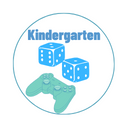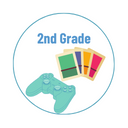Math Fluency Games: Engaging Ways to Master Mathematics
Mathematics is a crucial subject that forms the foundation of numerous professional and everyday scenarios. Enhancing one’s fluency in mathematics not only boosts cognitive abilities but also instills confidence when handling numbers. Math fluency games provide a compelling medium to achieve this mastery. They make learning engaging and accessible, transforming a potentially tedious subject into an enjoyable and interactive experience.
Kindergarten Math Games

Play free preschool and kindergarten math games for kids. Fun math activities for kindergarten
Go to page1st Grade Math Games

Math games for 1st grade students to play games and practice different math topics. Maths games for class 1
Go to page2nd Grade Math Games

2nd grade math games for kids to play and practice math problems. Maths games for 2nd class
Go to page3rd Grade Math Games

3rd grade math games for kids to play and practice math problems. Maths games for class 3
Go to page4th Grade Math Games

4th grade math games for kids to play and practice math problems. Fun math activities for 4th graders
Go to page5th Grade Math Games

5th grade math games for kids to play and practice math problems. Cool math games for 5th graders
Go to page6th Grade Math Games

6th grade math games for kids to play and practice math problems. Math jeopardy 6th grade.
Go to page7th Grade Math Games

7th grade math games for kids to play and practice math problems. Math games for grade 7
Go to page
What is Math Fluacy?
Math fluency involves the ability to solve mathematical problems quickly and accurately. Achieving fluency requires understanding, speed, and accuracy. It’s not just about knowing what methods to use but also about applying them in an efficient and timely manner. This skill is essential as it directly impacts the ease with which one can handle more complex calculations and problem-solving tasks.
Benefits of Math Games for Learning
Enhances Engagement
Games naturally make learning more enjoyable. They capture the learner's interest, leading to increased time spent practicing math skills without the typical resistance associated with traditional exercises.
Promotes Problem-Solving Skills
Math games often present problems in a format that is less intimidating and more interactive than conventional worksheets. This setting encourages learners to think critically and develop effective problem-solving strategies.
Supports Individual Learning Paces
Everyone learns at their own pace, and games are a great way to accommodate this diversity. They allow learners to progress according to their own comfort and ability level, which is often not possible in more rigid educational environments.
Types of Math Fluency Games
Board Games
Board games like ‘Sum Swamp’ and ‘Math Bingo’ offer interactive ways for multiple players to engage in math challenges, promoting both cooperative learning and healthy competition.
Card Games
Card games such as ‘UNO - Numbers Edition’ and ‘Math Rummy’ use familiar formats to reinforce number skills and quick thinking.
Digital Games
With the rise of technology, digital platforms offer a range of math games that are accessible on computers, tablets, and smartphones. These games often include engaging graphics and adaptive learning paths.
Worksheet Games
Traditional but still effective, worksheet games like puzzles and fill-in-the-blanks provide a quiet yet challenging way for students to practice math fluency.
Creating Your Own Math Fluency Games
Creating custom games tailored to specific learning objectives can be a rewarding process. This section would offer practical advice on how to design and implement these games effectively.
Integrating Games into the Math Curriculum
It's crucial to strike the right balance between fun and educational content. This section would discuss optimal strategies for incorporating games into regular math instruction to maximize learning outcomes.
Conclusion
Math fluacy games are not just tools for engagement; they are essential in fostering a deep, intuitive sense of number manipulation and problem-solving. By integrating these games into educational practices, parents and educators can provide learners with a fun and effective way to develop lifelong math skills.
FAQs
- What age group are math fluency games most effective for?
- How often should math games be incorporated into learning?
- Can math games replace traditional learning methods?
- What are some free digital math games?
- How do I assess progress in math fluency through games?










